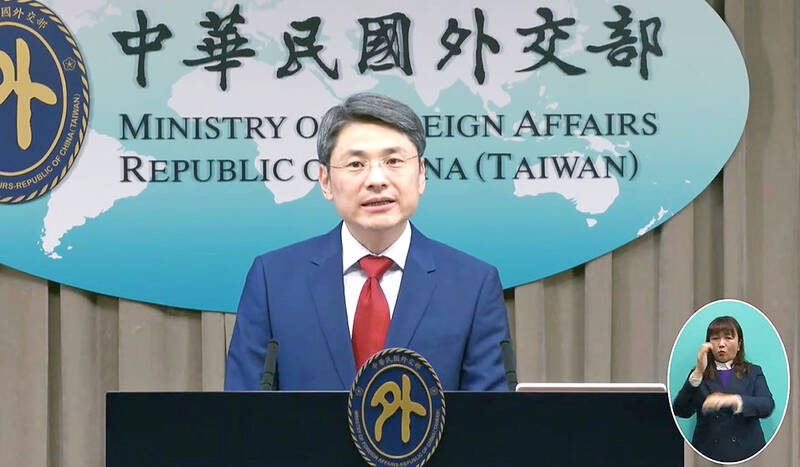Taiwan-US relations are closer and more vibrant than ever, and sowing skepticism over the US commitment to Taiwan is “a typical practice of Chinese cognitive warfare,” the Ministry of Foreign Affairs said yesterday.
The remarks came after Vice President William Lai (賴清德) ahead of the Democratic Progressive Party chairperson election said that the nation should never allow distrust of the US commitment to Taiwan to become a consensus in society, adding that attempts to sow skepticism are mostly made by people with malicious intent.
If they succeed, it would place Taiwan in an unfavorable position, he added.

Photo: screen grab from a Ministry of Foreign Affairs livestream
The ministry also weighed in on claims that Washington’s plan to sell Volcano Vehicle-Launched Scatterable Mine Systems to Taiwan would lead to the nation being contaminated with landmines.
“This is a typical practice of Chinese cognitive warfare, which is amplified through the work of certain local individuals,” Ministry of Foreign Affairs deputy spokesman Hsiao Kuang-wei (蕭光偉) told a news briefing. “They intend to erode the faith of Taiwanese and destroy Taiwan-US relations by seeking every opportunity to distort facts and take things out of context.”
Taiwan has formed partnerships with the US at the federal and local levels to address issues involving security, trade, education and culture, Hsiao said.
“Not only do senior government officials in the US show solid commitment to maintaining peace and stability across the Taiwan Strait, the US Congress has also demonstrated support for Taiwan by proposing a historically high number of Taiwan-friendly bills and through continuous visits of congressional delegations,” he said.
“Taiwan-US relations are in the closest and most vibrant period, as witnessed by all,” he added.
The US has kept its pledges to Taiwan in accordance with its Taiwan Relations Act, he said, adding bolstering Taiwan-US ties has become a bipartisan consensus in Washington.
Last year, the administration of US President Joe Biden announced the sales of eight arms packages to Taiwan, Hsiao said, adding that Biden has on multiple occasions expressed support of Taiwan.
The US supports Taiwan’s efforts to form partnerships with Japan and Australia under the Global Cooperation and Training Network, Hsiao said.
Taipei and Washington have been expanding their ties through the Economic Prosperity Partnership Dialogues, the Taiwan-US Education Initiative and a memorandum of understanding on humanitarian aid, he said.
The latest round of negotiations under the US-Taiwan Initiative on 21st-Century Trade showed determination from both sides to deepen trade ties, he said.

Taiwan is projected to lose a working-age population of about 6.67 million people in two waves of retirement in the coming years, as the nation confronts accelerating demographic decline and a shortage of younger workers to take their place, the Ministry of the Interior said. Taiwan experienced its largest baby boom between 1958 and 1966, when the population grew by 3.78 million, followed by a second surge of 2.89 million between 1976 and 1982, ministry data showed. In 2023, the first of those baby boom generations — those born in the late 1950s and early 1960s — began to enter retirement, triggering

ECONOMIC BOOST: Should the more than 23 million people eligible for the NT$10,000 handouts spend them the same way as in 2023, GDP could rise 0.5 percent, an official said Universal cash handouts of NT$10,000 (US$330) are to be disbursed late next month at the earliest — including to permanent residents and foreign residents married to Taiwanese — pending legislative approval, the Ministry of Finance said yesterday. The Executive Yuan yesterday approved the Special Act for Strengthening Economic, Social and National Security Resilience in Response to International Circumstances (因應國際情勢強化經濟社會及民生國安韌性特別條例). The NT$550 billion special budget includes NT$236 billion for the cash handouts, plus an additional NT$20 billion set aside as reserve funds, expected to be used to support industries. Handouts might begin one month after the bill is promulgated and would be completed within

NO CHANGE: The TRA makes clear that the US does not consider the status of Taiwan to have been determined by WWII-era documents, a former AIT deputy director said The American Institute in Taiwan’s (AIT) comments that World War-II era documents do not determine Taiwan’s political status accurately conveyed the US’ stance, the US Department of State said. An AIT spokesperson on Saturday said that a Chinese official mischaracterized World War II-era documents as stating that Taiwan was ceded to the China. The remarks from the US’ de facto embassy in Taiwan drew criticism from the Ma Ying-jeou Foundation, whose director said the comments put Taiwan in danger. The Chinese-language United Daily News yesterday reported that a US State Department spokesperson confirmed the AIT’s position. They added that the US would continue to

The National Development Council (NDC) yesterday unveiled details of new regulations that ease restrictions on foreigners working or living in Taiwan, as part of a bid to attract skilled workers from abroad. The regulations, which could go into effect in the first quarter of next year, stem from amendments to the Act for the Recruitment and Employment of Foreign Professionals (外國專業人才延攬及僱用法) passed by lawmakers on Aug. 29. Students categorized as “overseas compatriots” would be allowed to stay and work in Taiwan in the two years after their graduation without obtaining additional permits, doing away with the evaluation process that is currently required,